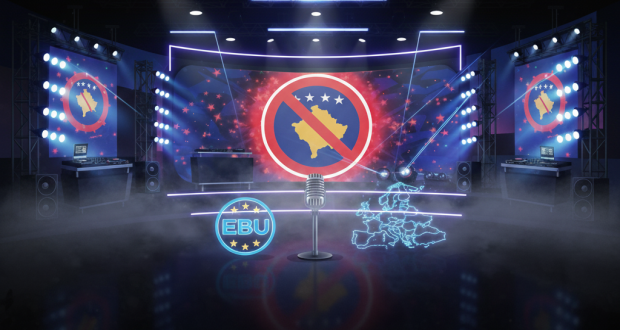Since the unilateral declaration of independence by the so-called Kosovo* in 2008, the story that Kosovo „could debut next year“ at the Eurovision Song Contest has periodically resurfaced.
Every time a new media statement, a new RTK director, or a new festival emerges, the question of whether Kosovo will appear on Europe’s biggest music stage is reignited in the region and among fans.
However, despite increasingly loud announcements in recent years, the entry of the so-called Kosovo into Eurovision is simply not possible, as European rules clearly dictate who can participate—and Kosovo does not meet them.
As information often appears on regional and international Eurovision portals, mainly from Western countries, suggesting that the so-called Kosovo will compete or should compete, we bring you detailed information on why it is not legally possible for our southern province to compete at Eurovision.
EBU rules that prevent the so-called Kosovo from participating in Eurovision
For a television broadcaster to participate in Eurovision, it must be an Active Member of the EBU (European Broadcasting Union). An Active Member can only be a public service broadcaster from a state that is a member of the ITU (International Telecommunication Union) or the Council of Europe.
RTK (Radio Televizioni i Kosovës), the public service broadcaster from the territory of the so-called Kosovo, is not an Active Member, but only an Associate Member of the EBU, which grants absolutely no right to participate in the Eurovision Song Contest.
Attempts to change this have lasted for years—a particularly important event took place in 2019 at the EBU General Assembly in Oslo.
On June 28, 2019, when a vote was held at the EBU General Assembly in Oslo on a statute amendment that would have opened the door for RTK from the territory of the so-called Kosovo to become an Active Member, the vote was conducted as a secret ballot.
Therefore, the EBU never published who voted how, nor is there a publicly available list of individual broadcasters. Only the total result is known—673 votes against, 400 for, and 113 abstentions—which led to the rejection of the proposal.
Various, often contradictory claims later appeared in the media regarding who allegedly supported the amendments (mentioning the BBC public broadcaster from the United Kingdom and Turkey’s TRT) and who was against (citing broadcasters from Greece, Cyprus, Romania, and Spain), but none of this has been officially confirmed.
Officially, the only thing known is that the proposal was rejected, and the so-called Kosovo was left without the possibility of participating in Eurovision.
Serbia, as a state that does not recognise Kosovo’s independence, clearly opposes any „back-door entry.“ Both according to current rules and the political situation, Kosovo still does not fulfil the formal conditions.
Official EBU response to our portal
In July 2024, our portal directly contacted the EBU with an official inquiry about the status of the so-called Kosovo and the possibility of RTK’s participation in Eurovision.
The EBU sent us the following response, which we translate in full:
„Participation in the Eurovision Song Contest is limited to EBU Members or specially invited Associate Members. Kosovo does not meet the criteria to be either a Member or an Associate Member of the EBU.
The EBU Statutes state that a Member must come from a country that is a member of the International Telecommunication Union (ITU) or is a member of the Council of Europe. Kosovo is neither.
The EBU helped establish the public service broadcaster of Kosovo—RTK—in 1999 and continues to work closely with RTK to safeguard public service media in Kosovo.“
This official EBU stance clearly confirms that there is no legal, statutory, or technical basis for RTK to appear at Eurovision—even in the near future.
The Kosovan festival – “Festivali i Këngës në RTK”
In 2023, RTK launched the music festival „Festivali i Këngës në RTK“, modelled after the older Albanian festival of the same name, which has been used as Albania’s national selection for Eurovision since 2003.
RTK’s idea was to create a „Eurovision format“ on its territory, presenting the festival as a long-term preparation for an eventual debut at the Eurovision Song Contest.
The organisers repeatedly stressed that the festival has „Eurovision ambitions,“ and the first editions were accompanied by media signals suggesting a desire to move closer to the EBU. During the first festival, even EBU Director-General Noel Curran appeared via video message to congratulate the launch of the event—however, this message had an exclusively ceremonial, collegial character, and was not a sign of support for Kosovan participation in Eurovision.
Despite this, RTK’s status remains unchanged. As an Associate Member of the EBU, RTK has no right to participate in Eurovision, and therefore the festival cannot be a national selection, nor does it have any weight in the Eurovision system.
Thus, „Festivali i Këngës në RTK“ has an exclusively local, symbolic, and cultural function—it can promote local performers, but it does not and cannot have any official connection with the Eurovision Song Contest, until the legal framework and international status change.
Cooperation with Albania
Due to the impossibility of RTK from the territory of the so-called Kosovo to participate in Eurovision, intensive musical cooperation with Albania has developed over the years. Kosovan artists very often perform at Festivali i Këngës, the Albanian national selection for the Eurovision Song Contest, which has represented their only realistic path to the Eurovision stage.
Over the years, several performers from the territory of the so-called Kosovo have achieved notable results, and some have even represented Albania at Eurovision.
The most famous example is Rona Nishliu, originally from Kosovska Mitrovica, who took 5th place in 2012, bringing one of Albania’s best placements in the history of the competition.
There is also Ermal Meta, a musician originally from the territory of the so-called Kosovo, who represented Italy in 2018 after a significant career in that country.
Also, Albania’s representative at Eurovision 2023 is originally from the territory of the so-called Kosovo, from Peć, which shows that Kosovan performers still have a significant impact on the Albanian Eurovision scene.
In this way, Kosovan musicians are enabled to indirectly appear at Eurovision, but exclusively through the Albanian public service broadcaster RTSH.
Albania’s performance at the Eurovision Song Contest 2012 in Baku (representative originally from Kosovo and Metohija)
Chronology of so-called Kosovo’s attempts to enter Eurovision (2008–2025)
First attempts and the year 2008
- Following the declaration of independence in 2008, RTK immediately expressed the desire for Kosovo to debut at Eurovision.
- That year, there was even speculation in the media that Kosovo would debut as early as the 2009 Eurovision Song Contest in Moscow, but it quickly became apparent that this was not possible because RTK did not have Active EBU Member status.
- Instead, RTK broadcast the Eurovision Song Contest for the Kosovan audience, but without the right to participate.
The 2010–2014 period – unsuccessful attempts
- During this period, Kosovo periodically announced „imminent membership“ in the EBU.
- In 2013 and 2014, news emerged that RTK planned to join the EBU, but there were no formal advances.
- RTK continued to broadcast Eurovision, which maintained public interest.
Junior Eurovision Song Contest 2014
- RTK negotiated for Kosovo to debut at the 2014 Junior Eurovision Song Contest in Valletta, but nothing came of it because the rules for the Junior Eurovision Song Contest follow the same membership requirements as the „main“ Eurovision—only Active EBU Members have the right to participate.
- Kosovo faced the same obstacle there as for the „main“ Eurovision.
Activities After 2015
- In 2016, RTK obtained Associate Member status of the EBU. This means that it can participate in working groups and programmes, but has no voting rights or the right to participate in Eurovision.
- RTK sent its teams to Eurovision, Junior Eurovision, and other EBU events multiple times for training and contacts.
The key moment – 2019 and the vote in Oslo
- At the 82nd EBU General Assembly (Oslo, June 2019), a statute amendment was proposed to delete the requirement for ITU membership.
- This would have opened the door for Kosovo to become a full member.
- The outcome: the proposal was rejected (400 for, 673 against, 113 abstentions).
- Kosovo remained an Associate Member without the right to participate.
From 2020 to today
- RTK continues to express ambitions for Eurovision. Every year, speculation appears in the media that Kosovo could debut, but there are no formal changes.
- It is occasionally mentioned that Kosovo could participate „exceptionally“ if the EBU finds a special model (similar to Australia’s invitation in 2015), but the EBU has never confirmed this.
- In 2023, the „Festivali i Këngës në RTK“ was launched, conceived after the pattern of the older Albanian festival of the same name, which has been used as Albania’s national selection for Eurovision since 2003.
- In 2024, the story of a possible debut was circulating again in Kosovan media, but still without concrete decisions.
- The current status of Kosovo is that RTK is an Associate Member, has no right to vote or send a representative to Eurovision, and until Kosovo becomes a member of the ITU or the EBU statute is changed, the status remains the same.
OGAE Serbia and this portal view Kosovo exclusively as an integral part of the Republic of Serbia, i.e., the Autonomous Province of Kosovo and Metohija.
 OGAE Serbia :: Vaš evrovizijski svet
OGAE Serbia :: Vaš evrovizijski svet



